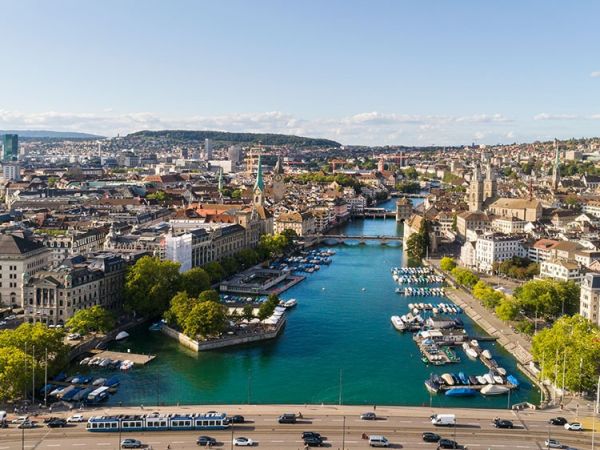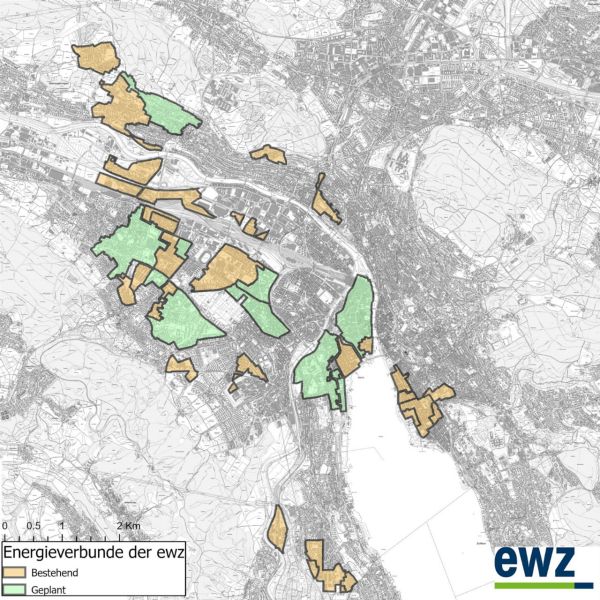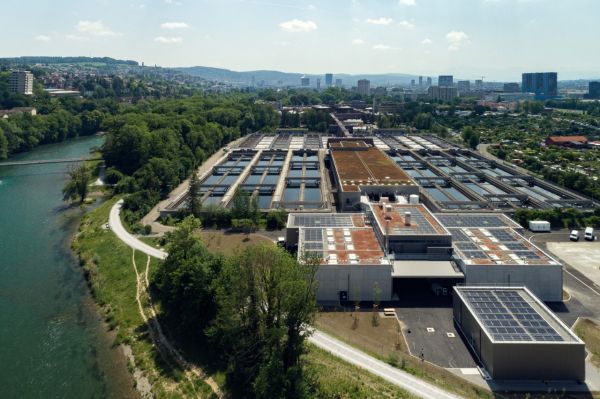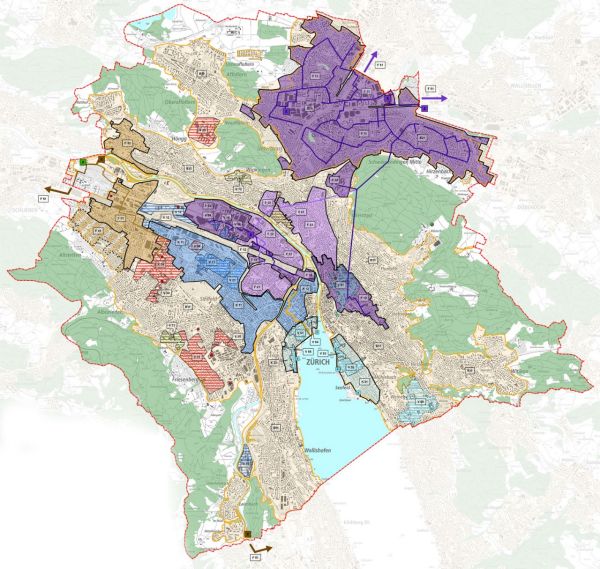

With the expansion of thermal grids, ewz intends to build more energy networks in Albisrieden, Altstetten, Aussersihl, City, Enge and Höngg in line with municipal energy plans and supply these with renewable heating and cooling energy. This has the potential to cut carbon emissions by another 52,000 tonnes a year. A credit facility of 573 million Swiss francs provides the financial support required for these long-term projects until 2040.
Municipal energy planning focuses on using and expanding energy carriers that require grid-based infrastructure and draw on local energy sources. Suitable areas have been marked on the energy planning map, with energy supply and consumption in the city of Zurich geographically demarcated on thematic maps. We have barely tapped the full potential of using renewables to generate heating and cooling and cut carbon emissions. At present, around 30 per cent of residential areas in Zurich have been developed for thermal grids by municipal utilities companies ewz and Entsorgung + Recycling Zürich (ERZ) as well as private network operators. The plan is to supply around 60 per cent of Zurich’s residential areas with climate-friendly heating and, in some places, with cooling from thermal grids by 2040.
Thermal grids will be built where there are energy sources with significant potential and suitable energy density (demand). Building the infrastructure for thermal grids in each of these areas requires the construction of energy centres and underground transmission lines and the creation of connections to supply individual premises. ewz plans to build new energy networks in areas located in Albisrieden, Altstetten (east), Aussersihl, City, Enge and Höngg (central). These new networks have the potential to help save a total of 52,000 tonnes in carbon emissions every year. By comparison, the Altstetten and Höngg energy network (existing parts and those still under construction) cuts carbon emissions by 30,000 tonnes a year and supplies roughly 30,000 households with eco-friendly heating and cooling.

The city of Zurich has various energy sources with the right potential, such as waste heat from data centres, a waste incineration plant and the Werdhölzli sewage treatment plant and ambient heat from sources such as lake water and groundwater. The new energy networks in the Enge and City districts use lake water. Biomass is set to be used in Albisrieden, and groundwater is expected to be the main heat source for Sihlfeld and the Hardau residential area. Air and woodchips are being tested as additional energy sources. The two energy networks in Altstetten East and Höngg Central are being connected to the existing Altstetten and Höngg energy network, sourcing their energy from the treated wastewater from the Werdhölzli sewage treatment plant.

Pre-investment in the Höngg Central energy network and CoolCity sub-project
Work to connect thermal grids to the energy networks is being coordinated and implemented in conjunction with planned road and utility projects carried out by the civil engineering office of the city of Zurich. This creates synergies, reduces emissions, minimises disruption to the public and optimises costs. Various works, such as installing transmission lines in the Höngg Central energy network and the CoolCity energy network sub-project, need to be integrated into other municipal construction projects, entailing upfront investments. This involves a credit facility of 3,576,000 Swiss francs for the Höngg Central energy network and another of 5,832,000 Swiss francs for planning for the CoolCity energy network project. The City Parliament approved both pre-investments on 30 March 2022.
Energy networks by ewz
ewz draws on locally available resources to supply heating and cooling, meaning it can implement energy solutions for complex sites and major projects and set up energy networks for districts and municipalities across Switzerland with a smaller environmental impact. It has already built various energy and heating networks, including several around the Lake Zurich basin, the Altstetten and Höngg energy network, the Schlieren energy network, the Ilanz heating network and the local heating network at Waid city hospital, Zurich. ewz harnesses its expertise to take on the planning, financing, construction and operation of the facilities, which collectively reduced the annual carbon emissions by roughly 66,227 tonnes in 2021. Around 90 per cent of investments made go to private business.
If the city of Zurich is to become climate neutral by 2040, it needs to cut its direct greenhouse gas emissions to net zero. By expanding thermal grids, the city is making a major contribution to transforming the heating and cooling supply, cementing its position as a role model in energy policy and laying the groundwork to meet the requirements of the ‘Energiestadt Gold’ label in the future. The thermal grids enable the city to play a key role in reducing resource consumption, cutting carbon emissions and other air pollutants, and supporting climate action and environmental protection.
Credit facilities are a well-established instrument that the City Council and ewz have been working with since 2003. ewz relies on quick decision-making processes for its projects. The City Council and the City Parliament were involved in the projects early on, and they set the parameters. If the electorate approve the credit facility, they also approve these parameters and empower the City Council to decide on how the credit facility is to be split among the projects, delegating the financial responsibility for larger investments to the City Council. Funds generated by ewz are used to make the investments, so they are not a burden on the city’s treasury or on taxpayers. The City Council and ewz will gain clarity and be able to plan and deliver the projects efficiently.
The City Parliament voted 107 to 14 in favour of the credit facility for the expansion of ewz’s thermal grids on 24 August 2022. The electorate of the city of Zurich will take to the polls on 27 November 2022 to decide on the credit facility totalling 573 million Swiss francs. The proposal put forward for approval by the electorate is as follows:
- A credit facility of 573 million Swiss francs for the expansion of ewz’s thermal grids in the Albisrieden, Altstetten, Aussersihl, City, Enge and Höngg districts. The amount of the credit facility will increase or decrease with changes in the Swiss Federal Statistical Office’s construction price index (price basis October 2021).
- The City Council will decide on how the credit facility will be split into smaller pots for specific projects.



